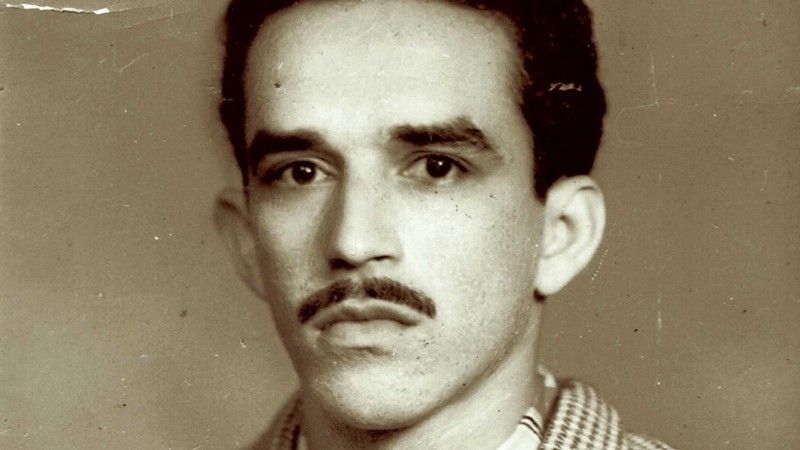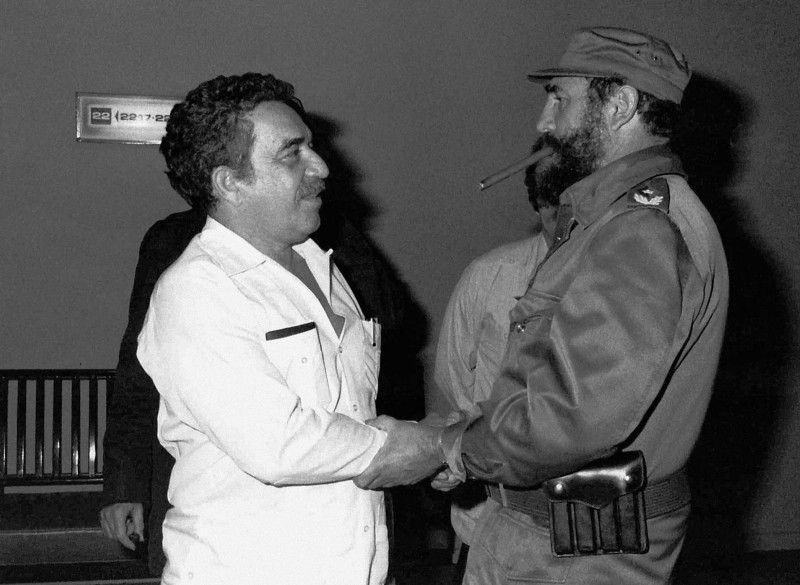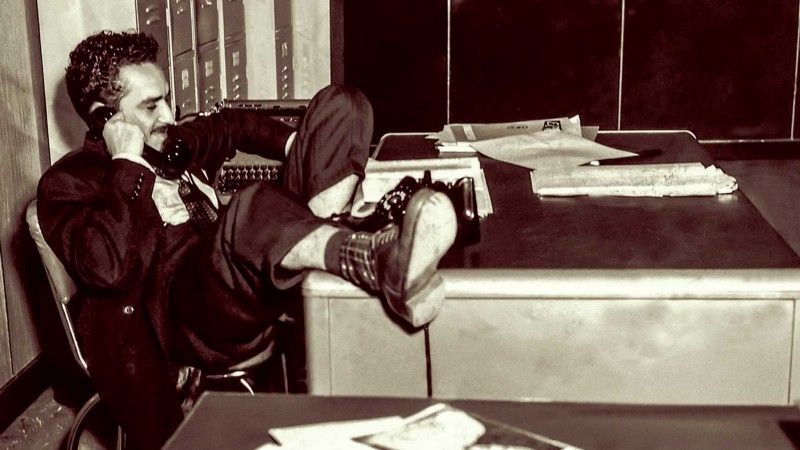
臺灣非營利專業書評媒體。Openbook編輯部將提供原生報導,文化觀察,人物採訪與國內外重大出版消息。 https://linktr.ee/openbooktaiwan
The Non-Fictional Doppelgänger of the Novelist: Zhang Yixuan on the Documentary "How Marquis Became Marquis"

Author| Zhang Yixuan (writer)
Every time I hear that Latin American novels are difficult to popularize in Taiwan, I am shocked. There was a time when I felt the atmosphere around me indicated that the most unexpected literature would only be born in Latin America—perhaps the excitement was a bit paranoid and overdone, and I usually put it only in In my heart, I don’t say it—however, regardless of whether it is a direct apprenticeship or not, in short, it is hard to imagine that whoever wants to study several important authors of Taiwanese literature can ignore the influence of Latin American literature. One of the best novels I've read in 2017 is Cisse. César Aira's "Ghosts", whose book is equivalent to him, seems to have only this translation in Taiwan. What is the structural factor behind this? Maybe I can ask Fang Jia again when I have the opportunity.
That is, this year (2019), I read in an interview that in the newly translated "One Hundred Years of Solitude", "Bondia" will become "Bondia", and I feel as if I am about to fall ill - as if Oranges have since been turned into tangerines. This is of course unreasonable willfulness as a reader, but this shock shocked me even more. It turns out that the character of Marquis is so deeply rooted in my heart that once the name is changed, it is as if you were renamed yourself. Of course, this is also because I had a youthful time in Marquez's novels that I was familiar with.... I can count Taiwanese writers who can recite paragraphs of Marquis's novels at will. In such a situation, should one care about the writer's life? Watch a biographical film of a writer? Sometimes very embarrassing. The former may not be as interesting as novels, and the latter may have inherent difficulties—I once said jokingly: “Painters can at least pat and splash, writer? Can the audience stare at the writer to write or type for more than 5 minutes? What does it have to do with literature when the writer is not writing?”

My statement is too extreme, because "How Marquis Became Marquis" (2015) can be said to have found a good balance. Video of the lecture notes on "Theory plus Literature". It is provided by the author of Marquez's biography, but many interviewees are more interested in "storytelling". This is a part of documentaries of the same type that often fail to do very well, and it is worth borrowing.
The emotion of the soundtrack is fresh and just right, and the video content has a clear look after being fully edited. The smooth 90 minutes presented multiple turning points in Marquez's life, and even the archives of his conversation with former Cuban Prime Minister Castro were found - so that we can directly see that the two were tit for tat. in the machine. The interview with former US President Bill Clinton did not focus on his love and admiration for Marquis, but indirectly let us know how Marquis sees his writing as an opportunity to intervene in social and political issues. Since Clinton became one of the focal points in the film, it would somewhat divert the audience's attention from Marquis's leftist anti-American background.
The film also recalls Marquis' most controversial and most well-known "koan case": his friendship with Fidel Alejandro Castro Ruz, who held many political prisoners and writers. I still remember reading a statement when I was young. It was said that when Marquis faced people’s doubts, he replied: If he was going to teach Castro how to handle politics, wouldn’t Castro teach him how to write novels in turn ? In this version, it's as if Marquis is a friend (or jerk) who doesn't want to take on more thought and responsibility. However, in the film, we will see that the truth is probably more complicated and subtle. Although it is impossible to get too deep into any issues in a short film, the different testimonies at least provide more clues, correcting the oversimplified image in previous legends.

Marquis has several atypical, but rather interesting, aspects of being a writer, if one follows the narrative in the film. On the one hand, he had a period in his life when he was not dominated by literature at all, and he devoted himself entirely to work not directly related to literature to support his family, and he did not feel maladapted. On the other hand, the desire to write would still strike him suddenly—and he would succumb to the urge to create like a fever or destiny. On at least two occasions, Marquis has been able to write for long periods of time by not paying or defaulting on rent, one of which was in the process of completing One Hundred Years of Solitude. This experience was narrated by Marquis himself in a highly "novelized" tone, which is very interesting to both the speaker and the listener.
Marquis is a very rational author, which has given considerable inspiration and inspiration to creators all over the world who are determined to defend their homeland and stationed in places, including Taiwan, of course. Honestly, it's hard not to get excited when the movie takes us through the key squares and alleys in The Chronicle of Death Prediction, after all, orientation is one of the most dramatic characters in the novel . I really hope that the picture can stay longer and let us see the scenes that have appeared in the novel one by one.

Many writers have been journalists at one point or another, but for Marquis, it wasn't just a passing career choice. Not only did he develop a certain literary eye of his own in deepening reporting, but throughout his life he also devoted his energy to personally nurturing better news writers—journalism was associated with freedom, equality, and access to the public. Although the news and media have made people feel terminally ill over the years, the literary nature of "non-fiction writing" has once again attracted attention and a trend - the film gives this "non-fiction avatar" that Marquis never gave up. , which is also another place where the film can stimulate our thinking today.
The Chinese translation title "How Marquis Became Marquis" is actually quite the essence of the film's narrative. At the age of 23, Marquis, who was seeking publication, was not only shot, but also persuaded to change careers. However, it was the same Marquis whose story was published a few years ago in a supplement to Colombia's "Nuevo Observatory", which also published a short article calling on readers to "pay attention to a budding and unknown writer", accompanied by The high praise that came, made Marquis have a strong literary affection of "no turning back in his life".
Originally, everyone thought he would become a singer, get drunk in college, and the newspaper where he worked in Paris closed down—how did Marquis become Marquis? It is indeed not a process that is always inevitable. It is not only a story of how his personal destiny has changed, but also full of literary history propositions worthy of consideration by literature lovers. Although the Nobel Prize in Literature has made Marquis known around the world, the editor who now seems to have become an "unknown editor" relative to Marquis does not rely on the literary vision and enthusiasm that the Nobel Prize is famous for. Just wanting to do your job responsibly, and isn't that more decisive than the Nobel Prize? The moral of this little story may be: about literature, rather than studying the mechanism of the Nobel Prize or the international literary world, it may be better to read and trust every "unknown writer" around us. ●
This article is reproduced with the permission of " Giloo Documentary Video ", the original title is: "The Unpredictable Chronicle of Marquis"
( The original text was first published on the OPENBOOK official website on 2019-08-19)
▋ Giloo Literary Film Festival: The Appearance of Writing

How Marquis Became Marquis
Marquis, winner of the Nobel Prize for Literature, is a representative figure of Latin American magical realism literature and one of the most influential writers of the 20th century. One Hundred Years of Solitude has inspired many souls over the years. After he became famous, he even tried to facilitate the reconciliation between the United States and Cuba. Starting from Aracataca, where he grew up in his childhood, the film traces the traces of Marquis from leaving his hometown, working as a journalist, and focusing on literature, while depicting his deeply humanistic side.
Like my work?
Don't forget to support or like, so I know you are with me..
Comment…